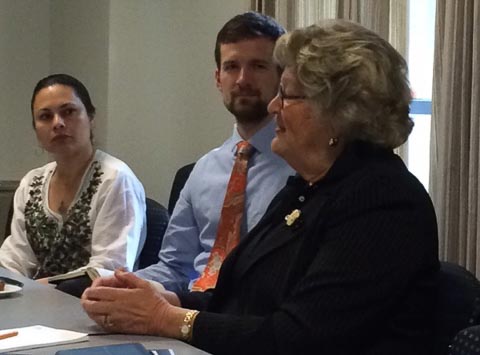Walshok, who serves as dean of extended studies at University of California San Diego, recalled the city’s transformation from a small town into a military community and ultimately a thriving technology hub.
The transformation came as a result of collaboration between the university, civic leaders, the business community and philanthropists, Walshok said.
One of the country's leading thinkers on workforce and economic development, Walshok spoke to professors and staff from the Kinder Institute for Urban Research ahead of a presentation scheduled for Thursday night at the Texas Medical Center.
San Diego’s story is chronicled in her book Innovation & Reinvention, which posits that other cities can learn from San Diego’s example and take deliberate steps to transform their economic identities.
She explained that in the 1950s, the city’s chamber of commerce, real estate developers and defense contractor General Dynamics put political capital -- and money -- into their push to get the University of California’s Board of Regents to establish a university in San Diego. The idea was to create an institution that could help capitalize on the research and development associated with the military presence in town.
They succeeded, but as Cold War tensions eased, it eventually became clear that the city needed another economic engine. “We just lived off government money, and with the end of the Cold War, it became not as sure,” Walshok said.
The solution was a plan to convene the city’s powers-that-be once more, this time as part of an effort to move from a defense-driven economy to one built on technology. Today, the city is a major hub for companies that specialize in wireless cellular technology and biotechnology.
The university recruited professors with tech skills, and the city’s chamber of commerce encouraged high-tech firms to come to San Diego and collaborate with scientists working there. Meanwhile, Walshok and her team at the university promoted collaboration between the city’s technology and business sectors. At the time, those types of links were common in Silicon Valley but not in San Diego, Walshok said.
The effort was dubbed CONNECT, and today, it’s a regional incubator linking inventors and entrepreneurs. “That is what began the momentum,” Walshok said. Since 1985, CONNECT has played a role in the formation and development of more than 3,000 companies.
That work is paying dividends. Walshok says San Diego has created 140,000 new high-wage jobs over the last 15 years that have a median annual salary of $90,000. Those salaries have contributed to the city’s growing tax base and are also helping philanthropy in the region to thrive.
Still, the city’s work isn’t done. “As we’ve developed our plutocrats, we’ve lost a lot of the blue-collar jobs,” Walshok said. “We’re an unbalanced economy.”
Now, she said, the region is trying to develop ways to improve job opportunities for semi-skilled workers in sectors like advanced manufacturing.
“There’s a recognition that an economy, much less a democracy, can’t exist without a middle class,” Walshok said.

